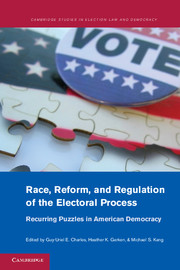Book contents
- Frontmatter
- Contents
- Figures
- Tables
- Contributors
- Preface
- Introduction: The Future of Elections Scholarship
- PART I RACE AND POLITICS
- Overview: How, If at All, Is Racial and Ethnic Stratification Changing, and What Should We Do about It?
- 1 Voting Rights
- 2 The Reconstruction of Voting Rights
- 3 Explaining Perceptions of Competitive Threat in a Multiracial Context
- PART II COURTS AND THE REGULATION OF THE ELECTORAL PROCESS
- PART III ELECTION PERFORMANCE AND REFORM
- PART IV CONCLUSION
- Index
- References
1 - Voting Rights
The Next Generation
Published online by Cambridge University Press: 01 June 2011
- Frontmatter
- Contents
- Figures
- Tables
- Contributors
- Preface
- Introduction: The Future of Elections Scholarship
- PART I RACE AND POLITICS
- Overview: How, If at All, Is Racial and Ethnic Stratification Changing, and What Should We Do about It?
- 1 Voting Rights
- 2 The Reconstruction of Voting Rights
- 3 Explaining Perceptions of Competitive Threat in a Multiracial Context
- PART II COURTS AND THE REGULATION OF THE ELECTORAL PROCESS
- PART III ELECTION PERFORMANCE AND REFORM
- PART IV CONCLUSION
- Index
- References
Summary
Today's Voting Rights Act (VRA) (1965), particularly its historically important Section 5, exists in a form and structure little different from the original Act of nearly forty-five years ago. The VRA of 1965 was a justifiably aggressive federal response to the race-based disenfranchisement of African Americans in readily identifiable geographic areas. Although it represented an unprecedented assertion of federal power over states and localities, the Act was in fact carefully and appropriately tailored to the historical context in which it originated. By focusing primarily on race-based denials of voting rights and by targeting its most stringent provisions to those areas with a history of race-based disenfranchisement, the VRA effectively tackled the predominant voting-rights issue of the prior century of American experience: the persistent efforts of mostly Southern jurisdictions to deny minority citizens the right to vote.
As a response to the specific historical conditions that existed in 1965, the VRA was perhaps the most effective civil rights statute enacted in the United States. It represented the last significant step toward universal inclusion of adult citizens in American democracy, and it effectively prevented recalcitrant state and local governments from crafting new laws designed to suppress minority voting. As a policy-making attempt to address contemporary voting-rights problems, however, the VRA – particularly Section 5 – might no longer offer the most effective means of securing access to the ballot box.
- Type
- Chapter
- Information
- Race, Reform, and Regulation of the Electoral ProcessRecurring Puzzles in American Democracy, pp. 17 - 33Publisher: Cambridge University PressPrint publication year: 2011

